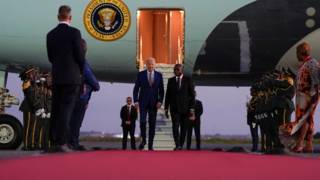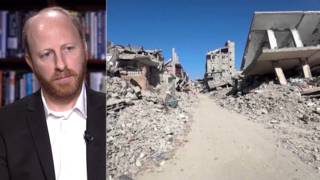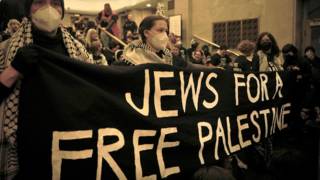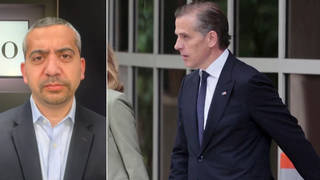
Related
Topics
Guests
- Stephen Vittorialongtime documentary filmmaker. Most recently, he is the writer, director, producer and editor of Long Distance Revolutionary: A Journey with Mumia Abu-Jamal. The film premiers in theaters in New York City Feb. 1-3. We recently featured his 2005 documentary, One Bright Shining Moment, about Senator George McGovern.
- Noelle Hanrahandirector of Prison Radio and a producer of Long Distance Revolutionary.
The new documentary, “Long Distance Revolutionary: A Journey with Mumia Abu-Jamal,” premieres today in New York City. We play an excerpt of the film and speak to writer, producer and director Steve Vittoria, as well as Noelle Hanrahan of Prison Radio, who has interviewed Abu-Jamal many times over the years. The film features many supporters of Mumia, including actress Ruby Dee, writer Tariq Ali, and author Michelle Alexander. [includes rush transcript]
Transcript
AMY GOODMAN: Eddie Vedder, singing “Society,” here on Democracy Now!, democracynow.org, The War and Peace Report. I’m Amy Goodman. The song is in this new documentary that’s premiering in the United States tonight. It is called Long Distance Revolutionary: A Journey with Mumia Abu-Jamal. And we’re joined now by its filmmakers. The film was written, produced and directed by Steve Vittoria, produced by Noelle Hanrahan, as well, of Prison Radio Project. Steve Vittoria, a longtime documentary filmmaker. We recently featured his 2005 documentary, One Bright Shining Moment, about Senator George McGovern. We’ll speak with them in a moment, but we wanted to bring you an exclusive, extended look at Mumia’s early life in Philadelphia’s Black Panther Party and as a radio reporter. In this excerpt, you hear from Mumia Abu-Jamal’s sister and former colleagues.
UNIDENTIFIED: It was gone, forever.
REPORTER: Ozora, let me ask you: What did Cassius say to you when you stepped into the ring and shook hands with him before the Terrell fight?
MUHAMMAD ALI: Muhammad Ali, no Cassius.
REPORTER: Excuse me, Muhammad Ali.
UNIDENTIFIED: “'Cassius Clay' is a slave name. I didn’t choose it, and I didn’t want it. I am Muhammad Ali.”
TERRY BISSON: He had a few great teachers. And one of them, who was from Kenya, taught the kids Swahili. And Mumia thought this was super cool, and so he decided he was going to take a Swahili name. He called it “Mumsia” at first, because he didn’t quite get it right.
LYDIA BARASHANGO: I guess that’s when I kind of gave him props. You got a new name. You know, this is really great. You dropped your slave name.
TERRY BISSON: I don’t know what his mother thought of that. I’m not sure he insisted that she call him Mumia.
LYDIA BARASHANGO: “I don’t care nothing about that stuff! I named you Wesley Cook! That’s your name! I don’t care what you try to call yourself! You’re Wesley Cook!” And she fought it for so long. But I know that Mumia went through some days where he ignored her calling him Wesley Cook. You know, “I changed my name, Mom.”
GOV. GEORGE WALLACE: In the name of the greatest people that have ever trod this earth, I draw the line in the dust and toss the gauntlet before the feet of tyranny, and I say segregation now, segregation tomorrow, and segregation forever.
TERRY BISSON: George Wallace is running for president in '68. The civil rights movement is in full cry in the South. The country is changing. It's being led by groups like SNCC and the Panthers. Mumia wanted to be part of that change.
MUMIA ABU-JAMAL: George Wallace was a candidate on the American Independent Party, very, very right-wing, although he probably wouldn’t be considered very right-wing in terms of America’s political context today, would he?
We were four black kids, teenagers, from North Philadelphia. And this avowed white supremacist, this racist from the depths of the South, dared to come to our city. Well, we went down to the Spectrum. There were tens of thousands of white people, you know, waving flags. And you had George Wallace making his standard stump speech.
GOV. GEORGE WALLACE: And I want to tell you this, that anybody who raises any money and blood and clothes for the Viet Cong communists, who are today hitting American servicemen, are guilty of treason under the Constitution of the United States.
MUMIA ABU-JAMAL: At that time, we weren’t very original, so the only thing we said was “Ungawa! Black Power! Ungawa! Black Power!”
GIANCARLO ESPOSITO: “Black Power! Ungawa! Black Power!” They shouted, “Wallace for president! White power!” and “Send those niggers back to Africa!” We shouted, “Black Power! Ungawa!” Don’t ask what “Ungawa” means; we didn’t know. All we knew is it had a hell of a ring to it.
MUMIA ABU-JAMAL: The police surrounded us, you know, in a matter of moments and escorted us—rather roughly, I should say—out of the Spectrum. There were people spitting on us. “Nigger this, nigger that.” I remember being pummeled and being beaten to the ground. And I remember looking around, and I saw a pant leg. It was blue and had a stripe on it, so it told me this was a cop. So, doing what I was taught to do all my life, I said, “Yo, help! Police!” You know? I remember the guy walking over very briskly and his foot going back, kicking me in the face, kicking me. And I’ve always said “thank you” to that cop, because he kicked me straight into the Black Panther Party.
AMY GOODMAN: That was Mumia Abu-Jamal in the new documentary, Long Distance Revolutionary: A Journey with Mumia Abu-Jamal, that is opening around the country starting today. The producer, writer, director of the film, Steve Vittoria, joins us, as well as the co-producer, Noelle Hanrahan of the Prison Radio Project.
We welcome you both to Democracy Now! These last few minutes you just heard Mumia on the phone directly from prison, but you just visited him yesterday, Steve.
STEPHEN VITTORIA: I was there with him yesterday. It was another one of our extraordinary visits together. I know it’s hard to believe that you go to a, you know, maximum security prison, and when he was on death row, and you have a good time. It’s really hard. It’s not a good time for Mumia, but he makes it a good time. What we’ve tried to do with the film is capture Mumia’s personality, the compassion, the love that Mumia has for people, because ultimately I think that’s what true revolutionaries—that’s where they come from. They come from a place of love.
I made the film because, you know, you wake up in a country, Amy, and you realize that the country is being run by mass murderers, economic rapists and general, run-of-the-mill psychopaths, so I started to look for some sanity. And for me, I found sanity in a dark, dank hall on death row in Pennsylvania. I had been a longtime reader of Mumia’s material, listening to the incredible broadcasts that you guys have broadcast. And my partner, Noelle Hanrahan of Prison Radio, has—a Herculean task—gotten his voice out all over the world. I wanted to offer some sanity. You know, John Pilger says that we have made the unthinkable normal in this world, and the normal unthinkable. I wanted to offer a ray of hope and some sanity, that Mumia, I think, offers all of us. You know, the people in this country have been offered war and violence and no healthcare and, you know, horrific contribution to the death of the planet. Mumia offers the opposite of that. And people ask me, they say, you know, “Well, how do you make a film about someone so radical?” I don’t think Mumia is radical at all. What I find radical are people that can lob cruise missiles into neighborhoods. So that’s what we’re trying to do: We’re trying to offer sanity.
AMY GOODMAN: From McGovern, subject of one of your films, to Mumia Abu-Jamal, what’s the trajectory?
STEPHEN VITTORIA: It’s a huge trajectory. George, as you know, was a—he was sort of his own—
AMY GOODMAN: The former senator, former presidential candidate.
STEPHEN VITTORIA: George McGovern. He was—he was a revolutionary within the system. I don’t know if that can ever work. George tried, and he made some changes. But real change comes from outside the system, and I think that Mumia is a bright, shining example of that.
AMY GOODMAN: Noelle Hanrahan, you have been making possible the broadcasts of Mumia Abu-Jamal’s life for many years, of his voice from prison, from death row, which Steve said is a Herculean task. We’ve run some of his commentaries. Why this film is important? It doesn’t focus on his case, actually.
NOELLE HANRAHAN: The state has always tried to minimize what Mumia means to the movements and also as Mumia as the journalist. And what we do is show you why his voice is important, and it deconstructs the right-wing narrative of that. If Mumia Abu-Jamal had been on the streets, had been able to be a reporter for the last 30 years, we may not be in this situation. The suppression of his voice, I believe, is directly related to what he has to say. And Prison Radio humanizes prisoners. It brings prisoners’ voices into the public debate and dialogue. I trust that this country needs that information and that we can make better decisions if we hear these people. Mumia happens to be an extraordinary journalist, reporting from an extraordinary place. And he demands to be into the public debate and dialogue.
AMY GOODMAN: The film opens today in New York City. It’s at Cinema Village and will run through the weekend, right through Super Bowl Sunday, and around the country, Steve?
STEPHEN VITTORIA: Yes. We start in New York City. We go to Seattle. We go to Miami. We go to New Orleans. And then we open in Los Angeles, my new home town, on March 1st, and on from there. So it’s—New York is our launch, and it’s really, really important to the success of the film.
AMY GOODMAN: That’s Cinema Village here in New York. And in Los Angeles in March, it will be at the Beverly Hills Laemmle. This is Democracy Now! I want to thank you both for being with us.
STEPHEN VITTORIA: Thank you.
AMY GOODMAN: Steve Vittoria, director, producer, writer of the film, Long Distance Revolutionary: A Journey with Mumia Abu-Jamal. Noelle Hanrahan of Prison Radio co-produced this film.
This is Democracy Now! When we come back, we’re going to talk Super Bowl Sunday. We’re going to talk about brain injuries. We’re going to talk about the dangers football players and others face, with someone who knows, with a former football player himself, who now runs a major brain injury institute at Harvard University. Stay with us.












Media Options